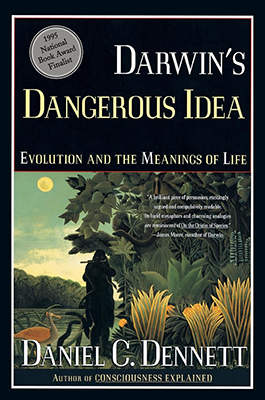Darwin’s Dangerous Idea
“Darwin’s Dangerous Idea: Evolution and the Meanings of Life” by Daniel Dennett is a seminal work that explores the profound implications of Charles Darwin’s theory of evolution by natural selection. Here’s a summary of the key themes and arguments presented in the book:
Evolutionary Theory: Dennett begins by explaining Darwin’s theory of evolution, emphasizing that it is not merely a biological theory but a powerful idea that has far-reaching implications for understanding life, cognition, culture, and ethics.
Universal Acid: Dennett famously describes Darwin’s theory as “universal acid” because it has the potential to eat away at traditional beliefs and change our understanding of the world at a fundamental level. It challenges traditional views of design and purpose in nature.
Algorithmic Process: Dennett portrays evolution as an algorithmic process that generates complexity and diversity through the mechanism of natural selection acting on random variation. This perspective shifts the focus from intentional design to gradual, incremental changes over time.
Memes and Culture: Building on his concept of memes (units of cultural transmission), Dennett explores how Darwinian principles can be applied to cultural evolution. He discusses how ideas, beliefs, and cultural practices evolve and spread through societies, analogous to biological evolution.
Philosophical Implications: “Darwin’s Dangerous Idea” addresses philosophical questions about consciousness, intentionality, and free will within an evolutionary framework. Dennett argues that these phenomena can be understood as emergent properties of biological and cultural evolution.
Critique of Creationism and Intelligent Design: Dennett critiques creationist and intelligent design arguments, arguing that they fail to provide scientifically testable explanations and do not fit within the framework of evolutionary theory.
Impact and Legacy: The book has been influential in shaping discussions about evolution, cognition, and philosophy of biology. Dennett’s clear and accessible style makes complex philosophical ideas accessible to a broad audience.
Overall, “Darwin’s Dangerous Idea” is a comprehensive exploration of evolution’s implications for our understanding of life, consciousness, culture, and ethics. It challenges readers to reconsider traditional beliefs and embrace a naturalistic worldview grounded in scientific inquiry.

